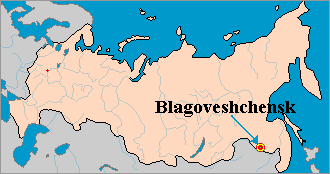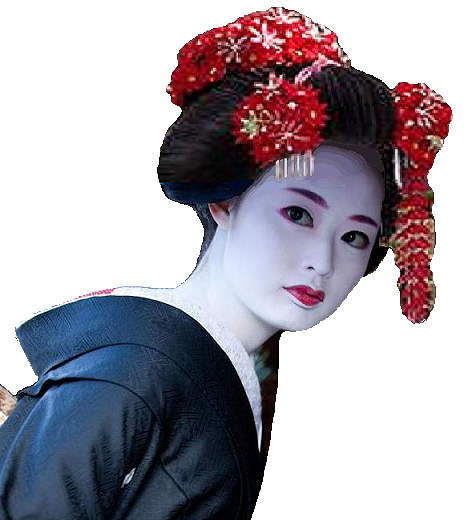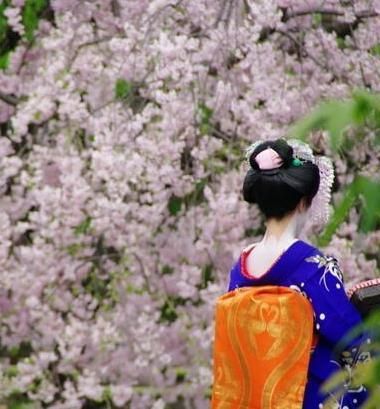Cherry and Silk(PART 2 OF 3)
<iframe width="420" height="315" src="http://www.youtube.com/embed/UxSzruTUtp8" frameborder="0" allowfullscreen></iframe>
His obsession somewhat puzzles me because he has never communicated with the concubine verbally---let alone sexually.
In any case, his obsession is so strong that he seems to do anything to meet her again, but to no avail.
Then he receives a long letter from the mysterious concubine, written in Japanese.
He takes the letter to Madame Blanche for translation, who agrees, providing he never comes to see her again.
Madame Blanche is a Japanese woman whose French merechant-husband has been long dead.
As a owner-and-manager of a high-class brothel, she lives in Lyon, a city in east-central France, and she is known for giving the small blue flowers that she wears to her clients.
The letter is a deeply moving declaration of love.
After his three journeys to Japan, his wife becomes ill and eventually dies.
Hervé finds a tribute of small, blue flowers on her grave.
He seeks out Madame Blanche once more, believing her to have written the letter, but Madame Blanche has moved to Paris without giving him a new address.
Hervé Joncour almost knocks at every door in Paris to find Madame Blanche, and finnaly he meets her.
<iframe width="420" height="315" src="http://www.youtube.com/embed/2SUs3wOcS2Y" frameborder="0" allowfullscreen></iframe>
Madame Blanche reveals a profound secret to him.
This is a big twist in this film.
I'd better not tell you about it.
After this revalation, Madame Blanche tells him that, more than anything, his wife loved him.
Too late, Hervé finally realizes that it was Hélène who was his true love after all.
It is a poetic film and really moving.
The Japanese scenery is authentic because it was filmed in a secluded part outside the city center of Sakata (酒田市、山形県).
You might be convinced that obsession is not love, but that it's more like illusion. Love is real and it's more like devotion.

I see... So you jotted down a rather philosophical comment at the very end, didn't you?

Yes, I did.

But I don't see any connection between the above movie and Anton Chekhov. Does Chekhov have anything to do with the above movie?
Yes, of course, he does. Otherwise, I wouldn't have talked about him in the first place.
Tell me, then, what on earth makes you think that the above movie has something to do with Anton Chekhov.
Obsession! ... That's it... Hervé Joncour was obsessed with the misterious concubine. Likewise, Anton Chekhov became obsessed with a certain Japanese woman.
Who the heck is that certain Japanese woman?
Read the following excerpt.
Chekhov died on July 15, 1904 after the Russo-Japanese War began in February.
Three days before his death, he wrote a letter to his friend: "Japan will probably lose the war, and I'm sad thinking about Japan's defeat."
When he reached the end of his life, Chekhov muttered "A Japanese woman ..."
But nobody understood his following words.
Mrs. Chekhov let him sip a bit of champagne.
He said to his doctor, "I'm gonn die" in German.
Then he looked up at his wife and said with a faint smile, "I haven't tasted champagne for a long time, haven't I?"
He slowly took the last breath and died quietly.
It was 3 o'clock in the morning.
Chekhov had never come to Japan, yet he muttered about a Japanese woman.
Why?
I was profoundly puzzled.
Later when I happened to read a book titled "Chekhov and Japan" written by Nobuyuki Nakamoto, I felt that I'd solved the mystery.
In the spring of 1890, Chekhov travelled to Sakhalin, and on his way back he dropped in at Blagoveshchensk---a town along the Amur River near the Chinese border.

(blagioveshchensk.png)

(chehogh90.jpg)
Something happened on June 26, 1980.
The next day, Chekhov wrote a letter to his writer-friend.

(maiko19.png)
Japanese women seem to understand shame in a peculiar way.
Whe I went to bed with this Japanese woman, she didn't put out the light.
When I asked a series of salicious question, she answered rather frankly---unlike Russian women who are pretentious with airs and graces.
She smiled constantly without much talking.
When it came to the love-making, she showed such exquisite manners and techniques that you would feel as if you were riding an expertly-trained horse rather than going to bed with a hooker.
Once it was over, she grasped my little dick lovingly and wiped it with soft tissues taken out from the sleeve of her kimono.
It was a grateful surprise, indeed.
Oh, I'm in love with Amur.
I wish I could live here for another two years.
... beautiful, spacious, and free and warm.
In France and Switzerland, I've never even once tasted the freedom like this.
At that time, in Siberia Primorye, there were a number of "Karayuki-san" or "Japanese hookers in foreign-land."
Chekhov certainly met one of those Japanese women.

(chehogh94.jpg)
This woman inspired an image of warmth and tenderness in Chekhov, and later led to a creation of the play: "The Cherry Orchard."
It was this modest yet unforgettable Japanese woman who taught Chekhov the beauty of pure white cherry.
(translated by Kato; pictures from Denman Library)
SOURCE:
pp.237-239 "Take a Walk in History"
Published in April 15, 2010
Author: Kazutoshi Handou
『ぶらり日本史散策』 著者: 半藤一利
2010年4月15日 第1版発行
発行所: 株式会社 文藝春秋

So, Kato, you're saying that Chekhov was obsessed with this Japanese woman, aren't you?

Yes, I am.
Quite interesting, isn't it? Hervé Joncour didn't have sex with the concubine, yet he was quite obsessed with the mysterious woman. On the contrary, Chekhov seems to have attracted to the exquisite manners and techniques of the Karayuki-san.
Yes, you're right on, Diane. Hervé Joncour looks like a man who tendes to look at the spiritual side while Chekhov seems like a man who focuses on the technical side.
Tell me, Kato, which woman you prefer to become obsessed with---the concubine or the hooker in foreign land?
It's hard to tell, but I'd say both.

【Himiko's Monologue】

"Karayuki-san (唐行きさん)" were Japanese women who traveled to East Asia and Southeast Asia in the second half of the 19th century to work as prostitutes.
It litetally means "Ms. Gone-to-China."

(karayuki2.gif)
Karayuki-san in Siberia
Many of these women were said to have originated from the Amakusa Islands of Kumamoto Prefecture, which had a large and long-stigmatized Japanese Christian community.
Many of the women who went overseas to work as karayuki-san were the daughters of poor farming or fishing families.
The mediators who arranged for the women to go overseas would search for those of appropriate age in poor farming communities and pay their parents, telling them they were going overseas on public duty.
The mediators would then make money by passing the girls onto people in the prostitution industry.
With the money the mediators received, some would go on to set up their own overseas brothels.
In any case, I hope Kato will write another interesting article soon.
So please come back to see me.
Have a nice day!
Bye bye ...

(To be followed)